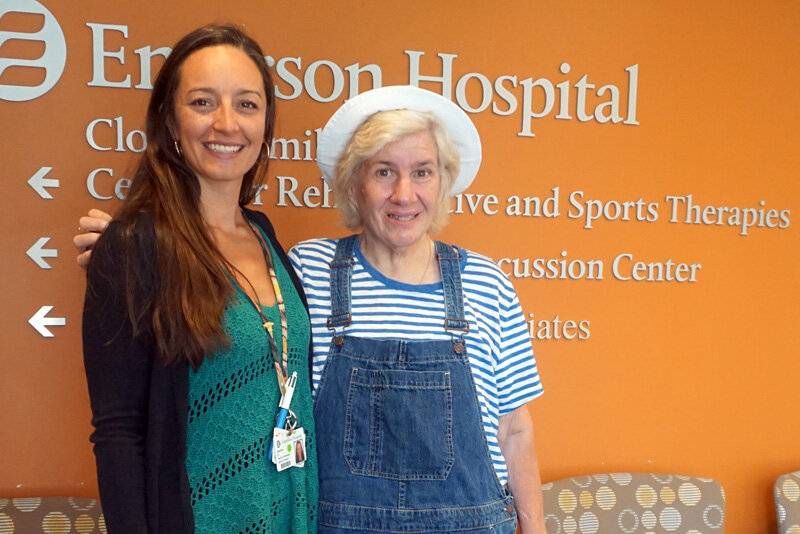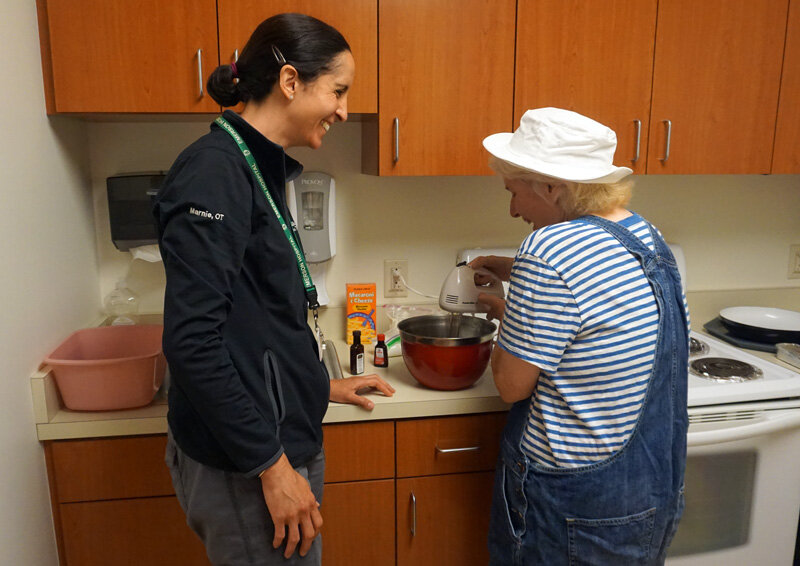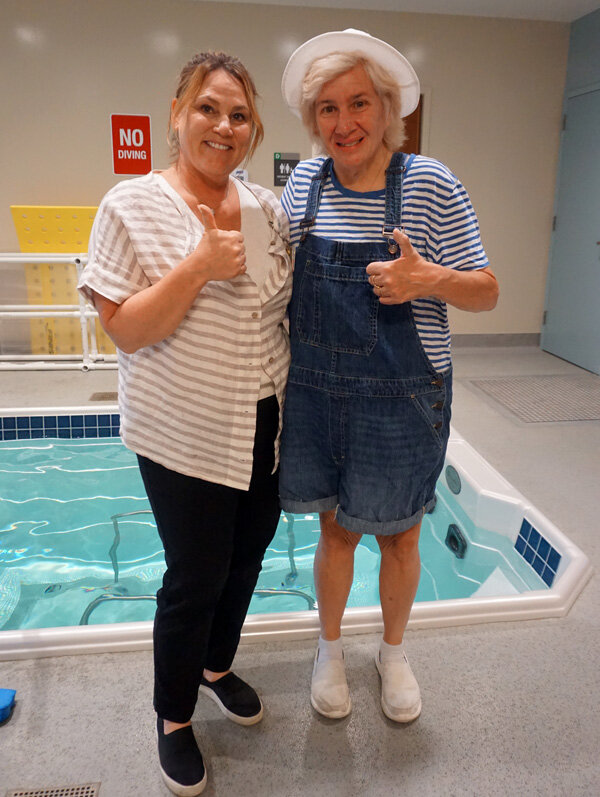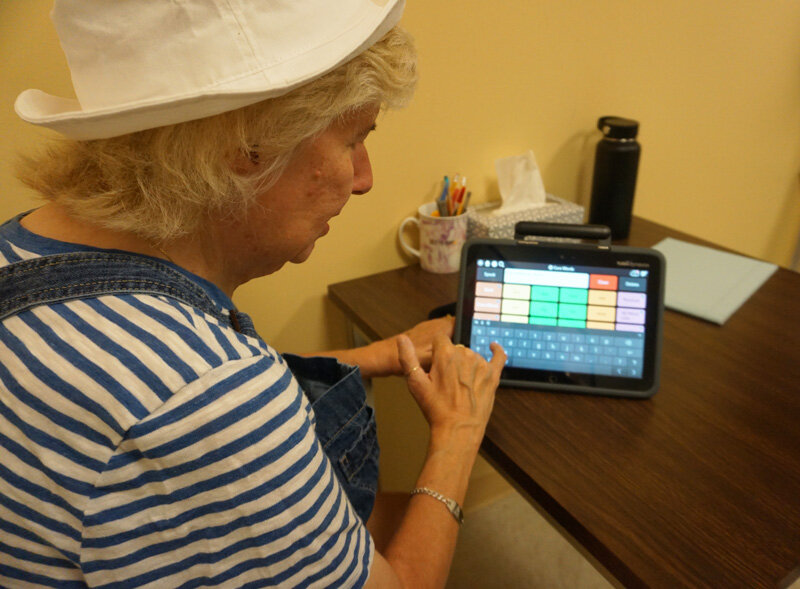Being able to communicate clearly and easily is a skill most of us take for granted in our day-to-day life. For individuals living with a speech problem, simply expressing wants, needs, and opinions can be a great challenge.
Motor speech disorder, also known as dysarthria, is a term used to describe speech changes that occur as a result of injury or disease. Dysarthria can occur in people with a variety of neurological diagnoses, including stroke, brain injury, Parkinson’s disease, ALS and multiple sclerosis. When the nerves and muscles that control speech are involved, speech might sound slurred, too fast or too slow, too quiet and weak, and very difficult to understand. In most cases, thinking skills are just fine, but getting the message across is a problem because of the clarity of speech.
Treatment for dysarthria involves working with a speech-language pathologist building strength and skills for communication. In some cases, individuals find great benefit from using a speech-generating device — a computer that allows them to select words and phrases to speak aloud.
Adapting to Life with Dysarthria
Meet Laura Wallen, a patient at the Clough Family Center for Rehabilitative and Sports Therapies at Emerson Hospital. She is living with dysarthria due to a progressive neuromuscular diagnosis. Over the years, her natural speech has become very difficult to understand. She now uses a speech-generating device and continues to be active in her family and community. In the Q&A below she shares her experiences living with dysarthria and using a device to help her communicate. She also describes how working with her speech-language pathologist and her occupational and physical therapists at Emerson have helped her along the way. She is living life to the fullest despite her challenges.
Q: Can you describe your motor speech challenges?
A: Due to my muscular condition, parts of my tongue are weak, so it is hard to speak and annunciate words.
Q: How long has this been going on?
A: Approximately seven years, having started with a stutter.
Q: What other symptoms do you have besides speech changes?
A: I have trouble swallowing. I now have to puree my foods, and with some liquids I add a thickener. Also, some muscle are wasting on my right hand and arms.
Q: What is it like living with a motor speech problem?
A: It is very frustrating and sometimes hurtful because people do not understand. Now I am fortunate enough to have a device (the Tobii Dynavox) that helps me to communicate.
Q: Do people make incorrect assumptions about you and your abilities based on the way you sound?
A: Yes, some people assume I am deaf and start speaking to me in sign language.
Q: Tell me a little bit about your speech-generating device.
A: I am considering myself very lucky to have my speech therapist, Brenda Lovette. She has made life much easier for me by introducing me to the Tobii Dynavox [speech-generating] device. This device allows me to customize and program phrases, important information, and personal phrases into it, along with allowing me to type out something on the fly, and it will speak it for me. This is very important in case there were ever an emergency, such as a diabetic shock as I am a type 2 diabetic, and allows me to get the help I need easily.
Q: How did you feel when you first got your device?
A: At first I was very intimidated by my device, but as I came to realize everything that I can do with it, I simply cannot be without it.
Q: Has your device helped you get back your independence in the community?
A: Yes, it has. When I go to the pharmacy, I type in my information, as well as at the doctor and my therapy appointments. Communicating with this device has been a lifesaver.
Q: What do you want people to know about you and your device?
A: I would like people to know that I am not deaf. I understand when people speak to me, and would like them to please take the time to become aware of others’ conditions. We are no different than you; we simply have just had to modify our way of living and communicating.
Q: What kinds of things have you worked on in therapy? How has therapy helped you with your challenges?
A: With my speech therapist, Brenda, I have worked a lot on both my speech and swallowing methods. From putting thickener in my drinks to finding ways for myself to get the proper nutrition I need by way of blending my foods and giving me alternatives to try, like Boost or Ensure. And of course helping me obtain my speech aid device, allowing me to be able to communicate much easier both in the community and in my daily life.
My occupational therapist, Marnie Deardorff, has helped me with my hand strength as well as my hand-eye coordination, on top of many methods for me to remain independent with my day-to-day situation. This involves methods of cooking and cleaning for my family, as well as getting myself dressed more independently.
I also work with my physical therapist, Ana Sanchez Junkin, to help maintain my muscle strength in both my arms and legs so that I can continue to be as functional as possible.
My aqua therapy therapist, Marcia Reinstein, has taught me many exercises to do in the pool that help to strengthen both my body and help my breathing. All of the therapists I am working with are a wonderful team who honestly go above and beyond their jobs and genuinely care about me.
Q: What is it like working with the therapists and staff at Emerson Outpatient Rehab?
A: At Emerson Rehab, the second you walk through the door, you are greeted by the receptionist desk. The kindness of the staff puts your mind at ease. Working with my therapists, I feel like I have known them forever, and I feel very comfortable and cared for with them.
Q: What advice would you give to someone who is living with a problem like yours?
A: My advice for anyone living with a condition like mine would be to hang in there. You may have to make adjustments in life, but you can certainly live a good life if you keep on top of everything and don’t give up. There are plenty of people and devices out there that can help.
When I interact with someone for the first time, I usually try to introduce him or her to my device and explain how helpful it has been to me in my everyday life.
Q: Anything else you'd like to share?
A: I would like to add that Emerson’s rehab center has opened my eyes to so many different ways to help myself with everyday functions and hope to live a good, long life.




